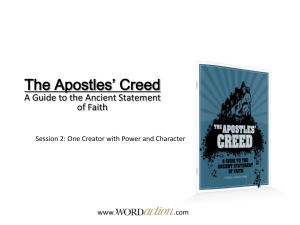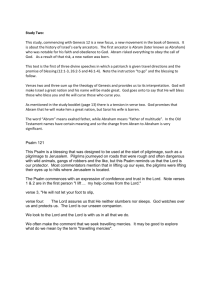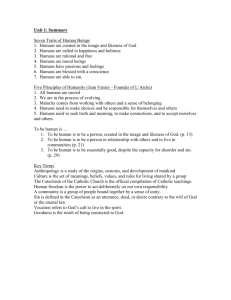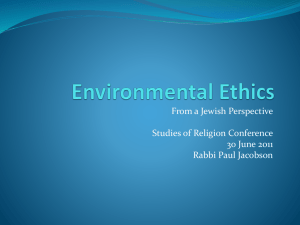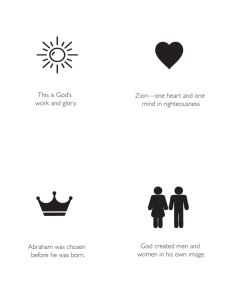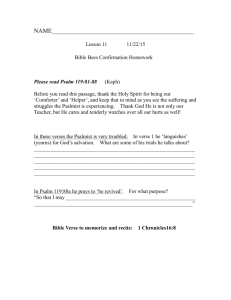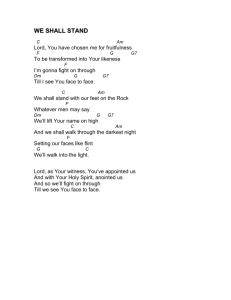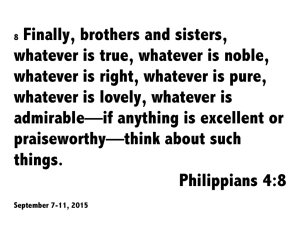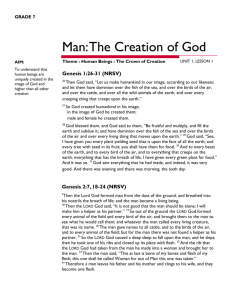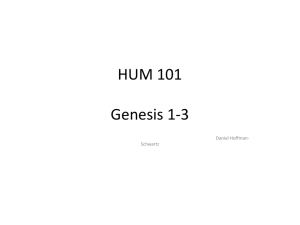Genesis 1-3: The God of Second Chances
advertisement
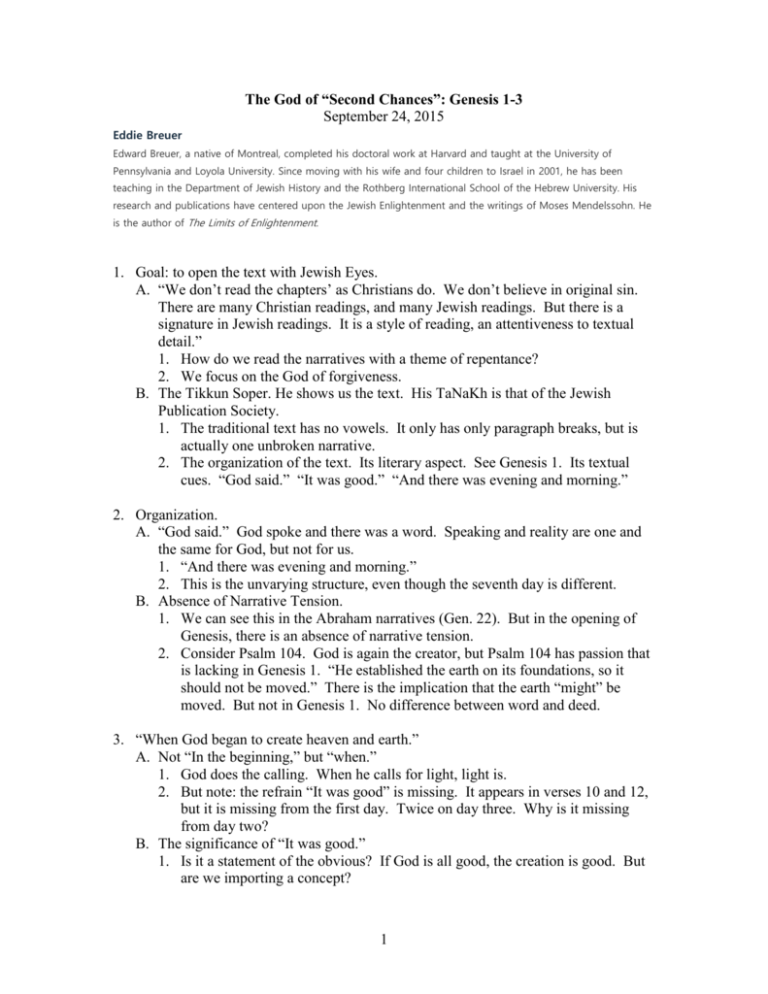
The God of “Second Chances”: Genesis 1-3 September 24, 2015 Eddie Breuer Edward Breuer, a native of Montreal, completed his doctoral work at Harvard and taught at the University of Pennsylvania and Loyola University. Since moving with his wife and four children to Israel in 2001, he has been teaching in the Department of Jewish History and the Rothberg International School of the Hebrew University. His research and publications have centered upon the Jewish Enlightenment and the writings of Moses Mendelssohn. He is the author of The Limits of Enlightenment. 1. Goal: to open the text with Jewish Eyes. A. “We don’t read the chapters’ as Christians do. We don’t believe in original sin. There are many Christian readings, and many Jewish readings. But there is a signature in Jewish readings. It is a style of reading, an attentiveness to textual detail.” 1. How do we read the narratives with a theme of repentance? 2. We focus on the God of forgiveness. B. The Tikkun Soper. He shows us the text. His TaNaKh is that of the Jewish Publication Society. 1. The traditional text has no vowels. It only has only paragraph breaks, but is actually one unbroken narrative. 2. The organization of the text. Its literary aspect. See Genesis 1. Its textual cues. “God said.” “It was good.” “And there was evening and morning.” 2. Organization. A. “God said.” God spoke and there was a word. Speaking and reality are one and the same for God, but not for us. 1. “And there was evening and morning.” 2. This is the unvarying structure, even though the seventh day is different. B. Absence of Narrative Tension. 1. We can see this in the Abraham narratives (Gen. 22). But in the opening of Genesis, there is an absence of narrative tension. 2. Consider Psalm 104. God is again the creator, but Psalm 104 has passion that is lacking in Genesis 1. “He established the earth on its foundations, so it should not be moved.” There is the implication that the earth “might” be moved. But not in Genesis 1. No difference between word and deed. 3. “When God began to create heaven and earth.” A. Not “In the beginning,” but “when.” 1. God does the calling. When he calls for light, light is. 2. But note: the refrain “It was good” is missing. It appears in verses 10 and 12, but it is missing from the first day. Twice on day three. Why is it missing from day two? B. The significance of “It was good.” 1. Is it a statement of the obvious? If God is all good, the creation is good. But are we importing a concept? 1 2. What is “good”? Is it the same as moral good? C. The deep. Day two separates the water. But water is never directly created. Is it primordial? Is it created? Is that because water is not created? All we know is that there is water above and below the dome, with the sky in between. And we do not say that it is “good.” 1. Could we say that the goodness is a judgment. Some (but not all) of creation is pronounced good. There may have been many worlds, and not all were good. Some were rough drafts, ultimately discarded. 2. Psalm 104 expresses concern that the world might “totter.” All creation is contingent. There were other worlds, better are worse. 3. Verses 10 and 12 have two “it was good.” Could one of the two have belonged to day two? 4. Days Five and Six. A. Living Creatures. They have to “fertile and multiply.” Procreation belongs to them. B. Man. 1. Note the background. There is a lack of narrative tension (in comparison, for example, with Ps. 104). a. There is another creation story: Enuma elish. Recited annually before the king. It has narrative tension. A female god, Tiamat, lords it over the other gods, and they turn against her. Out of her entrails comes the creation of the world. The humans are created out of the entrails. b. The humans are created as servants (“peons”) who make the lives of the gods easier. They are like ants who keep busy. c. Genesis, by contrast, is radical and subversive. “God said, ‘Let us make man out of our image and after our likeness.’” This differs from other creation stories. 2. Humanity’s Capacity to Rule. a. Human beings are meant to be the managers of the world that was created. b. The singular and plural. “Let us make* human beings in our image, after our likeness.” The “us” are the angels. God is turning to other heavenly beings, not other “gods,” but angels. In Judaism, angels, are “messengers,” the means through which God communicates. It’s a sign of humility. God consults them, engages them.The rabbis said, “They sat together and had an open discussion.” c. Then God creates. He brings the discussion to an end. “God created mankind in his image; in the image of God he created them; male and female* he created them.” 3. Image and Likeness. a. The “great bugaboo” of the Hebrew Bible is idolatry. So if man is “in” God’s image, then man can become an idol. b. Usually the “image and likeness” means the “soul” or the “mind.” Something in us shares with God’s divinity. 2 c. How do we distinguish between image and likeness? The word “likeness” is dropped (in comparison to image). 4. Humanity as a “gendered being.” Verse 27 suggests that the original creation of human beings was not gendered. 5. Mastery. Human beings are to subdue the earth and have dominion over it (verse 28). Could that be because human beings are “very good”? A. God’s attention to our needs. We are given seed-bearing plants and fruits, not animals. Even the animals have green plants for food. B. Verse 31: “It was very good.” When we come to day six, we are looking for this affirmation. 1. The importance of oral reading. Is mankind alone “very good,” but is all of creation “very good”? 2. All that God is made is “very good.” Not just man alone. About the goodness of man alone, God is silent. But is God? Verse 31 could imply that the creation, without man, may not be “very good.” Creation is not complete without man. “The uncertainty principle is built into the creation.” 3. Uncreated water. Is there something problematic about water? There are three creation stories: Genesis 1, Genesis 2, and the story of Noah. As the waters recede there is another creation. Water is problematic and interesting. It is not explicitly created. Water purifies and it destroys. But it is impure. It is cleansing and also destructive. C. Procreation. If we are created in the image of God, then the birth of children is the bringing God’s image into the world. The text leaves us with the image of God consulting with the angels. 1. The angels are consulted about the creation of humanity, but we do not know what advice they give. 2. We human beings are unpredictable, because we are able to do things on our own. We decide whether to procreate. We have free will. 6. The Narrative Tension of Psalm 104. A. In the Psalm, creation is dependent. In Genesis, independent. B. The subordination of creation. 34 out of 35 versis in Psalm 104 is passionate prayer of God. In the last verse, however, we meet the fly in the ointment: May sinners [hattaim – sinners, or even sins] vanish from the earth, and the wicked be no more. C. People do what they please. God does not control them. In all of the wonder, there is a problem: we human beings who were created by God. 1. Why were’t we created as unproblematic as the mountains and readers. We humans are capable of mitzvoth and also of sins. The Psalm “plays up God’s weakness.” 2. We human beings are loose cannon, the wild card, the fly in the ointment. Breuer likes Psalm 104 for illuminating Genesis. “God seems to be in such control, except in one area.” Coffee Break 3 7. Chapter 2. A. Another Creation Story. “This is the story of the heavens and the earth at their creation. When the LORD God made the earth and the heavens – there was no field shrub on earth and no grass of the field had sprouted, for the LORD God had sent no rain upon the earth and there was no man to till the ground,but a stream was welling up out of the earth and watering all the surface of the ground—then the LORD God formed the man out of the dust of the ground and blew into his nostrils the breath of life, and the man became a living being.” 1. The different perspective requires a different name for God. We are formed from the “dust of the earth.” God is “inspired” when God blows into the nostrils. “Almost like a kiss.” 2. Aesthetics. Physical nourishment. Two trees seem to represent good things. a. The Tree of Life. b. The Tree of the Knowledge of Good and Evil. 3. Rabbinic insight into the tree of life. a. We are biological. Like every biological entity, we are born, we grow, and die. But then we are in God’s image and likeness. So maybe we don’t die. b. We are very good. But the rabbis said that this “very good” includes death. B. The Prohibition. “The LORD God gave the man this order: You are free to eat from any of the trees of the garden except the tree of knowledge of good and evil. From that tree you shall not eat; when [on the very day] you eat from it you shall die” or “surely die.” 1. Human beings is not the “end” of creation, on day six, but at the “beginning” of creation, before anything. 2. This is a different creation story. C. God does not name things; man does. 1. Names mean things. “Jacob” means “the LORD laughs.” Naming is a power over. Describing, determining, identifying, relating. Above all, naming is about knowledge. It’s about knowing that someone is who one is, that one person is not another. 2. To name animals is about knowledge. A domestic cat and a lion belong to the same family, but are distinctive. [We are in the realm of metaphysics. We can see how things are the same and how they are different.] 8. The Creation of Woman and the Fall. A. The Creation. “The man gave names to all the tame animals, all the birds of the air, and all the wild animals; but none proved to be a helper suited to the man. So the LORD God cast a deep sleep on the man, and while he was asleep, he took out one of his ribs and closed up its place with flesh. The LORD God then built the rib that he had taken from the man into a woman. When he brought her to the man, the man said: “This one, at last, is bone of my bones and flesh of my flesh; This one shall be called ‘woman,’ for out of man this one has been taken.” That is why a man leaves his father and mother and clings to his wife, and the two of 4 them become one body. The man and his wife were both naked, yet they felt no shame.” 1. Breuer says that this is an ideal; it’s not about divorce. 2. One flesh and nakedness. “They felt no shame.” Why should they? How could they have the concept of shame.” B. The Fall. “Now the snake was the most cunning [shrewdest, cleverest] of all the wild animals that the LORD God had made. He asked the woman, “Did God really say, ‘You shall not eat from any of the trees in the garden’?” The woman answered the snake: “We may eat of the fruit of the trees in the garden; it is only about the fruit of the tree in the middle of the garden that God said, ‘You shall not eat it or even touch it, or else you will die.’” 1. The difference between orality and written texts. Man and woman were in a state of shamelessness, before shame had been created. 2. Nakedness. Nakedness is arumim, and the serpent is arum. C. Commentary. 1. Note: God didn’t say, “Don’t touch it.” God said, “Don’t eat it.” The woman has the privilege of going beyond God. 2. The serpent said, “You’re not going to die.” He tells the truth, thus far. “You will be like gods [or like “God who knows the difference between good and bad”]. 3. So what’s the problem with “knowledge”? Our traditions embrace it. Of course the Tree of Knowledge is going to open our eyes – that’s the point of knowledge. D. The Fall. “God knows well that when you eat of it your eyes will be opened and you will be like gods, who know good and evil.” The woman saw that the tree was good for food and pleasing to the eyes, and the tree was desirable for gaining wisdom. So she took some of its fruit and ate it; and she also gave some to her husband, who was with her, and he ate it. Then the eyes of both of them were opened, and they knew that they were naked; so they sewed fig leaves together and made loincloths for themselves.” 1. It opens her eyes, and it opens the eyes of the man. Do they “mature”? Do they recognize their “agency,” their capacity for free choice? 2. “In everything we do, we exercise free choice.” But there is a distinction. Do we exercise free choice when we do something thoughtlessly? We do it freely, but have we deliberated? Are “obligated” to choose when we choose thoughtlessly? Are we “obligated” to choose when we break the law? 3. The serpent is a sophist. By eating, we will “know” good and evil, but we will not have “done” good. Knowledge of nakedness – knowledge that we have sinned – is knowledge. But it is not knowledge in the medieval sense. In that medieval sense, we “become” or “are” what we know. But “are” we the evil that we do? a. A metaphysical analysis. According to the correspondence theory, we are what we know. b. But we are not the evil that we know. 9. Loss of the Preternatural Gifts. 5 A. The Story. “To the man he said: Because you listened to your wife and ate from the tree about which I commanded you, You shall not eat from it, Cursed is the ground because of you! In toil you shall eat its yield all the days of your life. Thorns and thistles it shall bear for you, and you shall eat the grass of the field. By the sweat of your brow you shall eat bread, Until you return to the ground, from which you were taken; For you are dust, and to dust you shall return. The man gave his wife the name “Eve,” because she was the mother of all the living.” B. Commentary. 1. We are mortal beings, but still above the angels, because we have choice. 2. Adam names Eve. He has power. But she is the “source of life.” 3. The preternatural gifts: Man has to till the soil, and he loses eternal life. Woman is subject to husband, and toils in childbearing. C. A punishment? In one aspect of the tradition, humanity loses these gifts, until they are restored through Jesus Christ. Christ is a restorative, a medicine. D. Breuer’s conclusion: God is a God of mercy. Yom Kippur celebrates the possibility of a world with forgiveness. We are able to stand up and ask God to forgive us as God forgave Adam and Eve. God who created us gave us the possibility of sin, and also of forgiveness. 6
